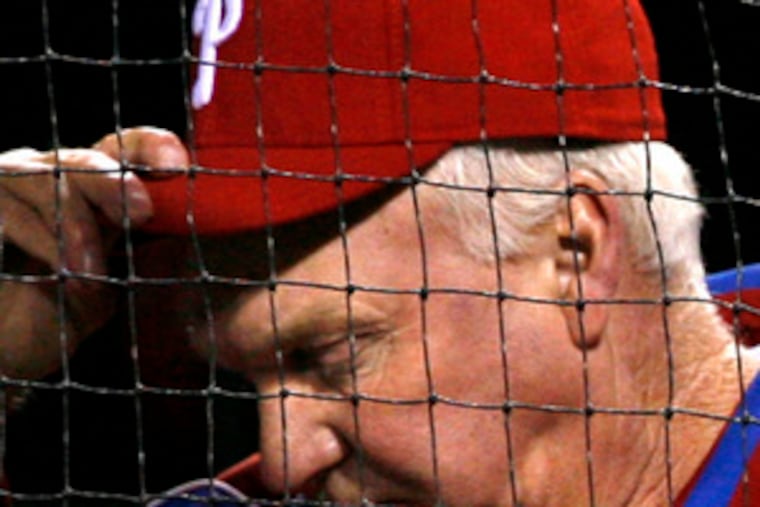Phil Sheridan | Firing the manager won't cure Phils' ills
It's hard to make a compelling argument for Charlie Manuel to finish the season as manager of the Phillies. That's not the same as making a sound argument for dismissing him.

It's hard to make a compelling argument for Charlie Manuel to finish the season as manager of the Phillies. That's not the same as making a sound argument for dismissing him.
In an April 22 column, I set yesterday as a good date to re-examine this issue. The logic: The Phillies are at roughly the same point in their season that the Toronto Blue Jays were in 1989, the only time Pat Gillick changed managers in-season in his career as a GM. Then, Gillick replaced Jimy Williams with Cito Gaston, and a 12-24 team went on to win the American League East.
The Phillies are 15-19, a full 7 games behind the division-leading Atlanta Braves as they begin a 10-game homestand tonight. Since April 22, they have gone 8-8. That's better than they started, not good enough to consider inspiring and yet not bad enough to flush the entire season away.
Here is the best, admittedly underwhelming case for Manuel: Over the last two years, in spite of serious bad patches during the season, his teams have held together and put together enough of a surge to get back into contention. Since that is exactly what the poor start requires of this team, and since big-time roster help is not likely on the way, then Manuel is as good as anyone for the job.
A less kind way to put this: This seriously flawed team has very little chance of accomplishing anything in 2007, so Gillick might as well stick with Manuel, let him finish out his contract and then make a fresh start for 2008.
Let's not even get into the question of whether Gillick is the right man to direct that fresh start. For now, it's enough to point out that he did not exactly equip Manuel with a first-class team. That has been the primary lesson of the season's first 34 games.
Gillick must know this. That might explain why, when asked by Inquirer baseball columnist Jim Salisbury whether he was still happy with his manager's performance, Gillick replied, "Yep."
That was it. "Yep."
To an old-school baseball man like Gillick, firing a manager can be interpreted as scapegoating him. It's something you do only if you truly feel the manager is holding back a good team. Right now, it's impossible to make the case that the Phillies are a good team.
Look at a couple of Manuel's recent in-game decisions in Arizona. (While pitching coach Rich Dubee has input, the manager is ultimately responsible.)
On Monday night, he pinch-hit for starter Freddy Garcia in the seventh inning with a runner on second. The Phillies tied the game in that inning, but the bullpen blew the game.
On Tuesday night, in similar circumstances, Manuel let Adam Eaton hit for himself with men on base. Eaton struck out and then gave up the go-ahead home run in the very next inning.
The outcome did not go Manuel's way on either decision. The first night, grasping desperately for some runs, he yanked the starter. The offense failed to produce a big inning. The second night, in equal desperation to stay away from his threadbare bullpen, he left the starter in. Eaton failed to get through another inning without giving up a home run.
You can debate either decision. What you can't debate is that both had roots in the deficiencies of this team. If the Phillies were scoring on a regular basis and if the bullpen was reliable, games wouldn't come down to gut decisions every night.
Manuel signaled his disgust with his bullpen, not for the first time, by his decision in the Eaton game. Gillick pointed an accusing finger at the lineup yesterday. They're both right.
Firing Manuel will not make the bullpen better. It might smack a sense of urgency into the everyday players. People like to point to in-season changes that work dramatically - Phil Garner's leading the Houston Astros to the playoffs a couple years back - but they're pretty rare, exceptions that prove no rule.
The last couple years, his teams in wild-card contention, Manuel stressed that the real goal should be to start strong, win 100 games or so and take the division. It seems pretty obvious that's not going to happen for him here.
There's not much reason to think it will help much for Gillick to change managers, whether it's now or any time up until the all-star break. But there's no reason at all to think it will hurt. That's more an indictment of the team than the manager, but that's where we are.
For Manuel, there's nothing at stake but pride. Gillick did not extend the manager's contract, so this is it. Manuel will get paid the same whether he manages the rest of the way or plays golf in Winter Haven.
So that leaves one question: When's tee time?